Mentoring & Coaching Advanced High School Student Research
We gathered six extremely successful high school science competition participants to discuss what makes a good mentor. Four of the participants did their work in their mentor's research facility and two did not. For the prospective mentor, this roundtable is an excellent introduction to what mentoring is all about. And, for the student, it provides some first hand experience of what you should and should not expect from your mentor.
As a prelude to our discussion, we asked each of the participants to rate the importance of a number of characteristics that might define a good mentor. On a scale of 1-5, where 5 signifies high importance and 1 signifies low, here are the results:
| Mentor Characteristics | Importance Averages |
| Willing to spend time explaining difficult concepts, usage of equipment, etc. | 5.0 |
| Personality compatible with the student's, easy to work with | 4.4 |
| Readily available in the lab | 4.0 |
| Has appropriate expectations for the student's time commitment to the project | 3.6 |
| Gives the student freedom to do a project in his or her lab that is not directly related to the mentor's own research | 3.6 |
| Readily available outside the lab (after hours) | 3.6 |
| Has mentored high school students before | 3.0 |
| If lacking experience in the mentoring of high school students, has mentored undergraduate college students (i.e., has some experience with students who are not graduate students) | 3.0 |
| Familiar with the content of a high school science curriculum (i.e., they know what knowledge they can expect from a high school student) | 3.0 |
| Familiar with the rules and paperwork for the advanced science competitions | 2.2 |
| Similar likes and dislikes to student's | 1.8 |
MODERATOR: Clearly, a willingness to take the time to explain difficult concepts stands out above all the other characteristics of a good mentor. I'd like each of you to tell me how this was important in your own research, and please give some specific examples.
VINNIE: Don't be afraid to ask your mentor questions. It is much better to ask your mentor a question about something that can be resolved easily, rather than spending a full day working on something that shouldn't really take that long. Also, by asking your mentor questions about theory, etc. you gain more knowledge, which you may be able to apply later in your project. For the project I worked on with a mentor, I was doing a lot of work with electronics. This included creating control circuits, and analyzing them with oscilloscopes and other hardware. Since I had never used this type of equipment in the past, I was really grateful that my mentor was patient and willing to explain the related concepts to me. By asking questions and having your mentor explain concepts, it will make you much more efficient in your research.
YIHE: My mentor's willingness to explain difficult concepts not only helped my understanding, but it also encouraged me to explore the topics further. For instance, I was having some trouble understanding the logic behind my statistical analysis. My mentor's patient explanations helped me to grasp the concepts very quickly, and I took time to read extra papers afterwards, just to supplement my understanding.
TERIK: I did not have a professional mentor who I worked with throughout my entire project, but as I have helped other students who have worked with professional mentors, it has been apparent that a successful mentoring relationship involves both the student and the mentor contributing appropriately to the project. As a student, it is critical that you do your part—you need to take the time to do all that you can to understand concepts, read up on how instruments work, and prepare for every imaginable aspect of your research project. Once the student has done his or her part, it is essential that the mentor be willing to answer questions the student might have, further explain concepts that he or she might not understand, and teach the student the skills needed to be a successful researcher in the field.
AMBER: There were a few times when I didn't understand something that was going on with my project and I asked my mentor for advice. For example, I asked her questions about how the chemicals were interacting with light on the thin-layer chromatography plate when the textbook explanations I had read made no sense to me. I also learned about experimental repeatability from her, something I had never needed to understand in school.
JANELLE: During my research, I worked closely with a graduate student. His willingness to explain difficult concepts enabled me to more fully comprehend the intricacies of the research area that I was investigating. Since I had never formally studied organic chemistry in high school, I found it very helpful when he was able to answer my questions and proffer explanations. For example, I often discussed the proposed mechanisms of reaction schemes with him, and together, we would examine electron transfers among chemical compounds during reactions, and the intense interactions between nucleophiles and electrophiles. Such conversations helped me attain a more complete grasp of related organic chemistry theory, which often provided insight into my experimental observations.
BENJAMIN: When a student starts a research project, he or she often begins by reading a lot of background research to understand his or her work. It is important to have a mentor there to make sure the student understands the big picture. Although a student might learn the outcomes of particular studies, it is equally important to learn how those studies impact the big picture. Knowing how the puzzle piece fits into the puzzle will be a tremendous help later on when the student presents his or her research. A very important question to keep in mind when presenting your research is what impact it could have on the targeted academic community. My professor also made sure I understood major concepts, which came into use throughout my research, but also when I was presenting and was asked very specific questions about my study.
MODERATOR: Mentors play a role in a student's research that ranges from simply answering questions from time to time, to offering to review experimental results and write-ups, to actually managing the research project on a day-to-day basis. What role did your mentor play in your research and was it appropriate for your personal needs?
JANELLE: While I did not directly engage in experimentation with my mentor, he guided me in drafting my research proposal, made several recommendations to help me revise my research proposal, provided me with some pertinent journal articles, and remained informed of my progress throughout the summer. My closest interaction over the summer was with the graduate students in the lab.
AMBER For me, the most important thing she helped me with was making me realize that my technique would be much more useful to chemists if it was both qualitative and quantitative. For the county science fair, I had some quantitative results, but they didn't really mean anything besides the fact that the red, green, and blue brightness values increased or decreased over a certain portion of my sample. My mentor suggested that I make the results more useful by relating the brightness values to the concentration of the chemical sample. Then I would have something that could be used to determine the amount of chemical spotted on the plate. With a lot more work, my quantitative analysis was perfected.
Since I worked at home, having someone available to answer my questions quickly was also very helpful. For example, I was having a lot of difficulty dissolving one of my chemicals. I tried lots of different solvents, polar and non-polar. I finally asked her what I could do and she suggested a solution that worked. Having a patient mentor who wants you to succeed and is willing to give you advice is very important. I think it is one of the best reasons to have a mentor. You save a lot of time and energy if you have someone to go to for advice. She also reviewed my research paper and gave me advice on how to present my results. With my parents' comments and my own edits, it turned out to be a great paper.
YIHE: My mentors were very helpful in guiding me. They answered my questions patiently, supported my ideas, and openly discussed research topics and problems that were foreign to me. When I was writing my research paper, my mentors patiently revised my writing after each draft and gave me valuable suggestions in regards to both the scientific content and the English grammar.
BENJAMIN: My mentor assigned a graduate student to oversee my daily activities, as graduate students were present more often in the lab on a daily basis. Although I was given independence in terms of the work I did during both years, the graduate student could answer more procedural questions. My mentor also made himself available in the event that I had questions for him. Whenever he entered the lab, he always asked how my research was going. One of the most rewarding parts of conducting research was that there was a sense of independence and trust. Nobody was constantly looking over my shoulder to see what I was doing.
VINNIE: My mentor (who was a graduate student at the time) helped propose a project and guided me toward next steps. He gave appropriate background on the subject, helped me design the experiment, and assisted me when I was stuck. My mentor also taught me how to use specialized equipment, such as machining equipment, oscilloscopes, and spectrum analyzers.
MODERATOR: To succeed at the top competitions, it is important to do original work, rather than a rehash of what someone else has done before. How important was your mentor in helping you to decide whether your work was original, doable, and relevant to others working in the field? Give me specific examples of what they did to help you.
VINNIE: I was able to discuss potential projects with my mentor, which related to research going on in the lab. As a result of our discussion, we were able to come up with an original project that catered to my interests.
YIHE: My mentors have a large amount of background information in my field of research, so with my original idea, we were able to work out the practical experimental procedures.
AMBER: After doing initial background research on my project, I realized that a solution for analysis of regular thin-layer chromatography didn't exist. That's how I knew my project would be original. My mentor did give me a few ideas about how my technique could be used, but I also did my own research to learn more about chromatography analysis and how it related to my project. When my mentor mentioned high-performance thin-layer chromatography, I did more research and that's when I realized I should look into making my technique quantitative. I don't think there was ever a specific conversation we had about how my work was original and how to make it more unique. Her general comments inspired me to look into things in more depth, and that's when I realized the potential of my project. I, along with some help from my parents, also brainstormed how to emphasize my project's unique and original aspects in my science fair presentations.
BENJAMIN: My research project was part of a larger project, which was novel in and of itself. One of the ways my mentor helped me create original methods was by explaining what had been done before. I was able to use that knowledge to adapt my methods to be more efficient.
MODERATOR: Many mentors review the students' research plans and final research paper. What did your mentor point out to you about your work, and how was that valuable to you?
VINNIE: When I worked with a mentor, he helped me write my initial paper, gave suggestions for the presentation, and gave more insight on the impact of our research in that particular field.
When I worked independently, my parents helped me with papers, presentations, and answering questions. Their input was very useful, especially in making my research presentations and papers lucid and easily understandable. In a lot of competitions, you might get judges who are not completely familiar with your particular sub field, so getting input from someone "outside," such as parents, can improve how you convey your research to others.
YIHE: My mentors have been very helpful in helping me to form the direction of my experiments throughout my research. Whenever things do not go as planned, I like to consult my mentors for possible solutions. As for my research paper, besides obvious grammar issues, my mentors pointed out things such as inadequate descriptions, lack of certain vital information, speculative conclusions, etc. Those edits were valuable to me, not just in terms of paper writing, but also in my comprehension of my work. At the same time, I find my mentors' advice on presenting the project very useful.
TERIK: I've helped many, many students prepare to take their work to top competitions, such as ISEF. Some of these students have worked with mentors and some have not. As I have worked with students over the years, it has become apparent that the most important thing a mentor can do is to help the student frame the presentation of his or her work in such a way that it will appeal to others in the field. The format of the paper, the wording, the style of writing, the format of references and citations, the design of tables and figures, etc. all need to be made consistent with the accepted professional standards of the field. The mentors know the "hot topics" in that particular field of science and therefore, are in a unique position to help the student identify the most important applications and implications of his or her work and present them to judges (other professionals in the mentor's area of science).
AMBER: My mentor was invaluable in reviewing my research paper, making sure it stood up to the standards of research papers in my area. There were so many edits on my paper when she got through with it! She helped me understand how most scientists in my area present their results and she taught me some specific vocabulary to use in my report. Without such advice from my mentor, the judges would not have understood the implications of my project! Before I changed my presentation, it's as though I was speaking a different language to the judges, one they didn't completely understand. My results made perfect sense to me, but they were not in a format that the judges were used to seeing. I had a great research paper and presentation after editing it many times with the help of my mentor!
TERIK: That is precisely the type of feedback I would have loved from a mentor!
JANELLE: Before I commenced experimentation, I drafted a research proposal that detailed my specific aim, pertinent background information, and my experimental plan. When I submitted my research proposal to my mentor, he made many inquiries and suggested additional topics for investigation. This encouraged me to solidify my understanding of the research area and focus my purpose.
BENJAMIN: My mentor provided advice at a few junctures, most notably during the paper writing and presentation aspects of the research. It is important to remember that first and foremost, this is a learning experience for the student. If a mentor simply takes the paper or presentation, makes edits, and later returns it to the student without explaining anything, the student hasn't gotten anything from the experience. Fortunately, my mentor explained some of the key aspects of the paper and presentation that captivate an audience. He explained what scientists want to see and how best to present it. He was very willing to see multiple versions of both to see how I had progressed.
MODERATOR: Most of you had mentors who had previously mentored high school students, or at the very least, had judged high school student science competitions. Yet, there was a split in the group, with some of you rating previous experience to be fairly important, and others rating it as not very important at all. Is it possible that previous experience is more important than some of you think?
BENJAMIN: Professors who have had experience with high school students generally understand their capabilities and are more willing to give higher-level research projects. Also, they are more willing to hire high school students and be supportive throughout the competition process.
AMBER: I think previous experience with competitions can be helpful if they have it, but this is going to be very unlikely. I also find it unlikely that your mentor will discuss a plan for making a great science fair project and act as a science fair coach. If you ask them to, then maybe they will. I think they are more useful as a guide for the research process and the research paper. A well-written research paper is a huge part of the competition process. Having graphs and charts that show a lot of information, understanding the impact of your project, and just good writing skills help a lot for the competition. Even though my mentor had judged a science fair before, I didn't ask her too much about preparing for one, partly because I had done so many competitions before. I think the most important thing is that your mentor be supportive if you do a competition—previous knowledge is not required.
As for having previous experience with high school students, I don't think it's very important. If the mentor at least realizes what you are capable of and knows something about a typical high school student's science knowledge, that is what's most critical. They need to be patient with the students and reactive to the students' needs.
MODERATOR: About half of you had mentors who were familiar with the advanced science competitions and half did not. As a group, you rated mentor knowledge of the competitions to be of relatively low importance. I'm sure that's good news to potential mentors who may be reading this discussion. What are your thoughts on this issue?
BENJAMIN: In both years, my mentors had high school students work in their labs and win competitions; however, in terms of specifics, they needed briefing on how the competition process worked. It is the students' responsibility to work with the mentors to teach them about these competitions and have appropriate paperwork signed in a timely manner. However, the student might want to gauge the professor's willingness to complete paperwork in a timely fashion. Does it take him or her a long time to respond to emails? On the other hand, some professors overlook the importance and prestige of these competitions if they are not familiar with them.
TERIK: It's part of your job as a student preparing for top competitions to know the rules and regulations of each competition you plan on entering. That is NOT your mentor's job. It is your responsibility to teach your mentor applicable rules and to help him or her complete the necessary paperwork.
MODERATOR: What were the strengths and weaknesses of your own mentor?
YIHE: As I said before, my mentors were genuinely interested in science, so just talking to them made me excited, too. A vital strength was also their attention span. Even though they both had very busy schedules, they managed to free up some time to talk to me whenever I needed help. They really cared that I learned something. My mentors were also very, very patient. This is important to me, as I am not one of those geniuses who can "get" everything instantly. My mentors were pretty good at writing, too, so my paper-writing skills improved after they went through my papers a couple of times. Hmm, as for weaknesses, I haven't found anything substantial yet :-) I am very grateful for my mentors.
BENJAMIN: Strengths
- Positive Role Model
- Gave good advice
- Easy to talk to about work
- Provided appropriate articles to read
VINNIE: I think most important was the willingness of my mentor to explain concepts and spend time with me. My mentor was very patient and willing to explain concepts whenever I did not understand something. I think a potential weakness of mentors, in general, is underestimating a student's capabilities (or even overestimating). This might cause the project to be either too easy or too difficult.
AMBER: The only weakness really wasn't her fault—she was far away, so I had to contact her through email and by phone. Since I only needed to ask her a few questions from time to time, this worked out fine. As for strengths, she was a great editor for my paper. She was always thorough with her responses, and she got back to me quickly. She never seemed frustrated with me or annoyed if I asked her many questions (she was patient). She knew enough about high school education that her responses were never over my head. She did have previous science fair judging experience, but as I mentioned earlier, I did not ask her too much about this topic. For my purposes, my mentor complemented me and my project very well.
MODERATOR: In addition to your mentor, did you receive support from family members or teachers?
TERIK: My teachers were amazing; even though they didn't always (or necessarily often) understand precisely what I was doing, they shuttled me back and forth between locations, did their best to review my papers and prepare me for judging, opened their wallets, and provided some spectacular moral support. I couldn't have asked for more dedicated teachers. My parents, being neither scientists nor engineers, often hadn't a clue about what I was actually doing science-wise, but were great chauffeurs, listeners, and display board assemblers.
JANELLE: I also received support from my high school teacher, Ms. O'Donnell, who is the coordinator of the Independent Research program for my school district. During the summer, she visited all of her students who were conducting research in labs to make sure that they were content. Additionally, she made recommendations about the organization of our research papers, and she guided us in our completion of paperwork for science competitions.
AMBER: One of my high school teachers lent me some equipment. My parents were very helpful all throughout the process. At times, they were my "lab monkeys," helping me when I needed an extra hand. They also posed as practice judges, and helped me proofread my work and put my display board together. My dad helped me strategize about how to present and "sell" my results so that the most important points were clear and powerfully presented. My parents also helped me obtain supplies that weren't readily available.
YIHE: Besides my mentors, I also received help from my father, who is a molecular biologist, during various stages, such as brainstorming ideas. My biology teacher at school also looked at and critiqued my paper. Overall, I feel that there are just so many sources of information, and one should try to take advantage of them whenever she or he can. I sometimes asked other scientists in the University of Georgia Genetics Department (where I conducted my research) if the questions pertained to their areas of expertise.
BENJAMIN: I was part of a program in high school that guided students through the competition process.
VINNIE: Yes! Even though my teachers did not directly help with my project, they were very supportive by letting me miss their classes and make up work when I was away at all science competitions. Also, teachers usually have to fill out some type of paperwork for the competitions, which mine had no problem doing.
My family was very supportive as well. Mentors don't necessarily have to be your day-to-day research mentors; your parents can serve as mentors as well. My parents helped proofread papers, took me to the science competitions, helped me prepare presentations, helped with time-management, and encouraged me every step of the way. I was also able to brainstorm with my dad, who is very knowledgeable in computer science, and he was able to guide me and help me use various tools.
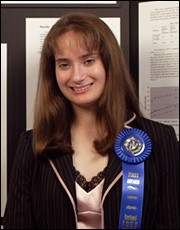
|
Amber Hess was a Mentor in the Science Buddies Online Mentoring Program for three years. A passionate science student, she has won awards at many prestigious science competitions. In 2005 she was an Intel Science Talent Search Finalist (one of only 40 students in the entire country), a semi-finalist for the Siemens Westinghouse competition, and she won a First Place Grand Award in Chemistry at the Intel International Science and Engineering Fair (ISEF), which she also attended in 2003. She has qualified to compete at the California State Science Fair five times, winning 4th, 3rd, and two 1st place awards. Amber graduated from MIT in 2009 with a BS in Chemical Engineering. |
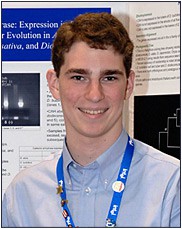
|
Benjamin Pollack was a Mentor in the Science Buddies Online Mentoring Program for two years. In addition to being named 2nd Place National Finalist for teams in the 2005-2006 Siemens Competition, he has also won Third Place and Fourth Place Grand Awards at the Intel International Science and Engineering Fair (ISEF), as well as a special award from the Society of Technical Communication. Benjamin is now attending the University of Rochester. |
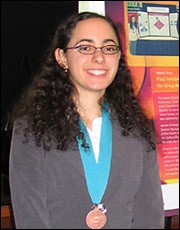
|
Janelle Schlossberger was president of her school's Science Honor Society, editor-in-chief of a district-wide literary and art magazine, and a member of Science Olympiad, French Honor Society, and National Honor Society. An accomplished violinist and pianist, she was a finalist in the DuPont Challenge Science Essay Competition. In addition to being 1st Place National Finalist in the Siemens Competition, she also won a 4th Place Grand Award at the 2008 Intel International Science and Engineering Fair. Janelle is proficient in French and plans to study physics in the Harvard class of 2012. |
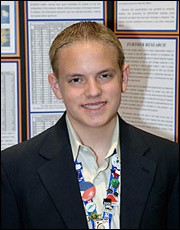
|
Terik Daly competed at Intel ISEF three different times and won numerous awards each year, including a "Best of Category" at ISEF 2006. He was a semifinalist in both the Intel STS and Siemens Competition and competed at the California State Science Fair for several consecutive years, winning awards including "Best of Fair" in 2005. Terik is currently an undergraduate at Brigham Young University majoring in Geology. His research interests include the study of residual lunar volcanism, transient lunar phenomena, and chemical speciation in meteorite and micrometeorite impacts. |
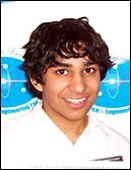
|
Vinnie Ramesh, MIT class of 2012, is passionate about research. He has won multiple awards in major science competitions including Second Place Grand Award in Computer Science at the 2008 Intel ISEF, Semifinalist in the 2008 Intel Science Talent Search, and Western Regional Finalist in the 2007 Siemens Competition to name a few. When not working on his research Vinnie likes to spend his time fencing, reading, and playing video games. |
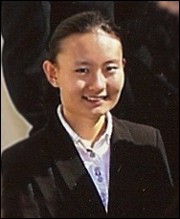
|
Yihe Dong enjoys research and writing. She has received 1st Place and Best of Category Awards at the 2007 Intel International Science and Engineering Fair (ISEF), and a 1st Place Award at the 2008 ISEF. Yihe is a finalist at the 2008 Intel Science Talent Search (STS). She is very grateful to her research mentors at the University of Georgia and the dedicated staff at Science Buddies for making her dreams reachable. Yihe is a member of the Princeton class of 2012. |




